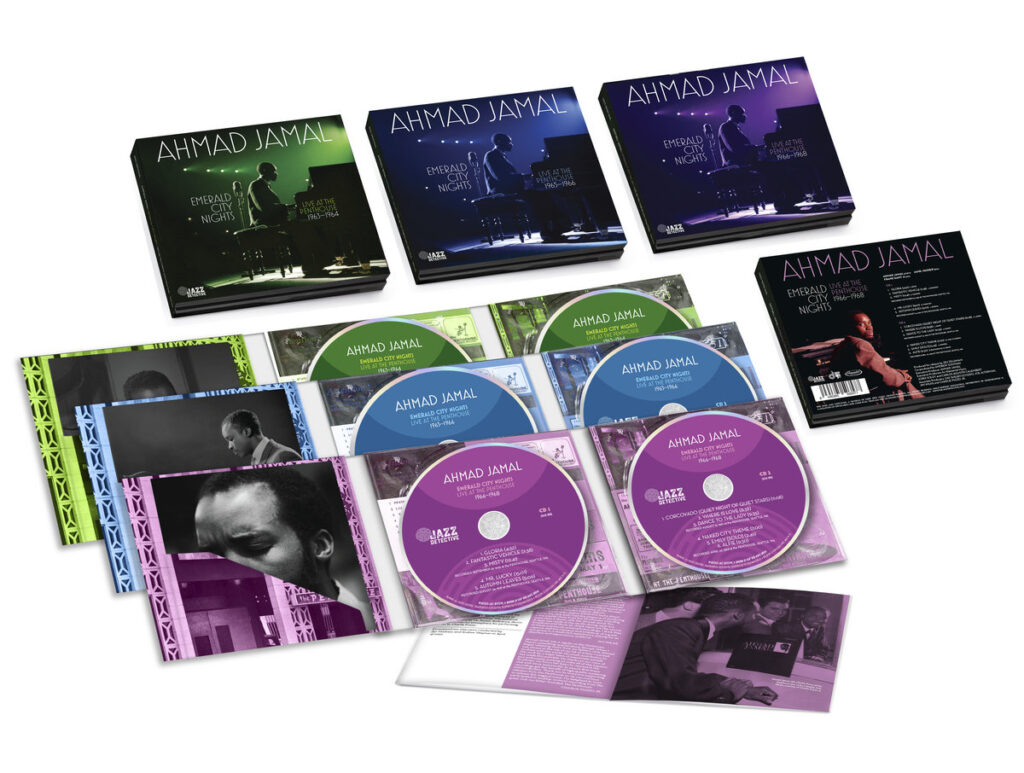The holiday season of 2023 brought an abundance of reissued and newly-released recordings from the Fifties and Sixties. This survey was supposed to publish in mid-December, but several of the promised albums did not arrive, and by the time I could compile these brief reviews, the Christmas mailing deadlines were long past. So, brighten your winter nights with the albums reviewed below.
DAVE BRUBECK QUARTET: “LIVE FROM THE NORTHWEST, 1959” (Brubeck Editions 2310001)
The title of this album does little to entice the prospective consumer, so let me set the stage. It is April 1959, and while they may not realize it, the Dave Brubeck Quartet were on the cusp of a new chapter in their professional lives. On tour in Portland Oregon, the group’s repertoire features music they are about to record on a new LP of Southern songs, “Gone with the Wind“. In August, they returned to the Columbia studios to record the album that would be their biggest artistic and commercial success, “Time Out“. With “Blue Rondo a la Turk” and “Take Five” newly added to their concert repertoire, the DBQ would focus on original works set in unusual time signatures. The 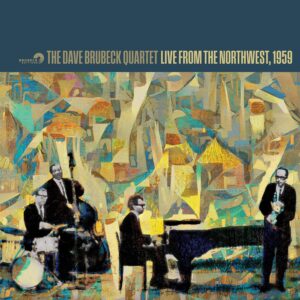 Portland concerts, issued for the first time on “Live from the Northwest“, offer a glimpse at a simpler time, with plenty of long, inventive solos by Paul Desmond and Dave Brubeck and delicate improvised counterpoint during the melody statements. Longtime Brubeck fans might be surprised to find a live DBQ recording missing their traditional opener, “St. Louis Blues”. They may have played it in Portland, but the opening track here is an even older warhorse, “When the Saints Go Marching In”. This must have been an audience request (probably from someone who didn’t realize the inappropriateness of the suggestion) but Desmond leaps into a multi-chorus solo with gusto, producing a statement nearly as inventive as the Oberlin “Way You Look Tonight” or the Copenhagen “Tangerine“. Brubeck constructed his solo in three separate sections with the most powerful statement in the center. The three songs to be included in “Gone with the Wind” (title tune, “Basin Street Blues” and “Lonesome Road”) are more inspired here than in the studio recording, and the gentle setting of “These Foolish Things” recalls some of the earliest college concerts by the Brubeck Quartet. The crisp stereo sound was captured by the legendary West Coast engineer Wally Heider, and it is incredible to hear the clarity of each snare drum hit by Joe Morello and the rich bass tones of Eugene Wright. This album is a hidden gem, and a must for Brubeck fans.
Portland concerts, issued for the first time on “Live from the Northwest“, offer a glimpse at a simpler time, with plenty of long, inventive solos by Paul Desmond and Dave Brubeck and delicate improvised counterpoint during the melody statements. Longtime Brubeck fans might be surprised to find a live DBQ recording missing their traditional opener, “St. Louis Blues”. They may have played it in Portland, but the opening track here is an even older warhorse, “When the Saints Go Marching In”. This must have been an audience request (probably from someone who didn’t realize the inappropriateness of the suggestion) but Desmond leaps into a multi-chorus solo with gusto, producing a statement nearly as inventive as the Oberlin “Way You Look Tonight” or the Copenhagen “Tangerine“. Brubeck constructed his solo in three separate sections with the most powerful statement in the center. The three songs to be included in “Gone with the Wind” (title tune, “Basin Street Blues” and “Lonesome Road”) are more inspired here than in the studio recording, and the gentle setting of “These Foolish Things” recalls some of the earliest college concerts by the Brubeck Quartet. The crisp stereo sound was captured by the legendary West Coast engineer Wally Heider, and it is incredible to hear the clarity of each snare drum hit by Joe Morello and the rich bass tones of Eugene Wright. This album is a hidden gem, and a must for Brubeck fans.
WES MONTGOMERY: “FULL HOUSE” (Complete Recordings) (Craft 682)/
WES MONTGOMERY/WYNTON KELLY TRIO: “MAXIMUM SWING: THE UNISSUED 1965 HALF NOTE
RECORDINGS” (Resonance 2067)
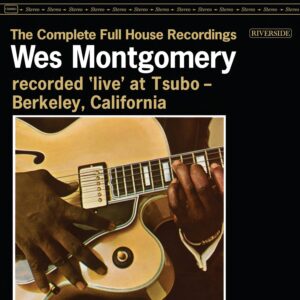 By the summer of 1962, Wes Montgomery had been playing professionally for several years. However, his upcoming Riverside album “Full House” would be a milestone, as his first live album to be issued. He took this challenge very seriously, composing three new originals and organizing the quintet for the sessions. Johnny Griffin was a great frontline partner to the guitarist, as the two men inspired each other through their soulful improvisations. The Wynton Kelly Trio with Paul Chambers and Jimmy Cobb, were there on a night off from their usual gig with Miles Davis, and their tight swing and unflagging support proved why they were the best jazz rhythm section of its day. The venue, a Berkeley coffeehouse called Tsubo’s attracted huge crowds on the night of the session with audience members lined up out the front door onto the sidewalk, with another sizable group gathered out back surrounding the garage which doubled as a recording booth (with Wally Heider again at the controls). Craft’s new 2-CD edition includes all of the music recorded that night. The magnificent original album appears on the first disc, with a perfectly balanced tune sequence by Orrin Keepnews, featuring brilliant Montgomery originals opening both LP sides with a slow ballad and a swinging standard appearing as center tracks, and great blowing vehicles to close each half. The alternates appear on the second CD, and they are only slightly below the level of the issued takes. On the title track, Keepnews lifted Montgomery’s solo from an alternate take for the master recording; the new album includes the track with the original solo restored as well as the edited version. The only low point comes at the very end of the set with two substandard attempts at Mel Tormé‘s “Born to Be Blue”. It sounds like the band did not have the lead sheet at hand, and the tracks have mistakes and faulty intonation throughout. Thankfully, Montgomery recorded an elegant version of “I’ve Grown Accustomed to His Face” to fill the space.
By the summer of 1962, Wes Montgomery had been playing professionally for several years. However, his upcoming Riverside album “Full House” would be a milestone, as his first live album to be issued. He took this challenge very seriously, composing three new originals and organizing the quintet for the sessions. Johnny Griffin was a great frontline partner to the guitarist, as the two men inspired each other through their soulful improvisations. The Wynton Kelly Trio with Paul Chambers and Jimmy Cobb, were there on a night off from their usual gig with Miles Davis, and their tight swing and unflagging support proved why they were the best jazz rhythm section of its day. The venue, a Berkeley coffeehouse called Tsubo’s attracted huge crowds on the night of the session with audience members lined up out the front door onto the sidewalk, with another sizable group gathered out back surrounding the garage which doubled as a recording booth (with Wally Heider again at the controls). Craft’s new 2-CD edition includes all of the music recorded that night. The magnificent original album appears on the first disc, with a perfectly balanced tune sequence by Orrin Keepnews, featuring brilliant Montgomery originals opening both LP sides with a slow ballad and a swinging standard appearing as center tracks, and great blowing vehicles to close each half. The alternates appear on the second CD, and they are only slightly below the level of the issued takes. On the title track, Keepnews lifted Montgomery’s solo from an alternate take for the master recording; the new album includes the track with the original solo restored as well as the edited version. The only low point comes at the very end of the set with two substandard attempts at Mel Tormé‘s “Born to Be Blue”. It sounds like the band did not have the lead sheet at hand, and the tracks have mistakes and faulty intonation throughout. Thankfully, Montgomery recorded an elegant version of “I’ve Grown Accustomed to His Face” to fill the space.
The subtitle of the new Resonance collection “Maximum Swing: The Unissued 1965 Half Note Recordings” might confuse some potential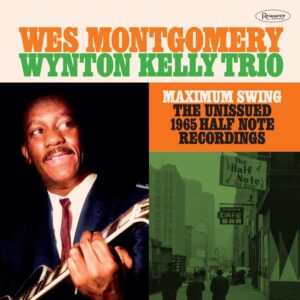 buyers. This is not the legendary “Smokin’ at the Half Note” album recorded by Verve in the summer of 1965 (find a copy of Verve’s double-disc “Impressions: The Verve Jazz Sides” to hear the complete Verve recordings). The Resonance collection includes stereo FM radio broadcasts made in the latter weeks of the same engagement. Verve had already recorded three nights in the club, and being satisfied (correctly) that they had a great album ready for release, they moved on to other projects. On the Resonance tapes, the group is very relaxed as they stretch out for long exploratory solos. Paul Chambers is not present for most of these recordings, but the subs Ron Carter, Larry Ridley, and Herman Wright anchor the group effectively. The set has only one misstep, in a version of “All the Things You Are” which speeds up like a runaway train while losing all sense of the original tune’s harmonic elegance. The final five tunes of the set were recorded by an amateur engineer, and judging by the brief notes by mastering engineer Matthew Lutthans, it took a Herculean effort to enhance these tapes to professional standards. While the fidelity is noticeably lower here than on the radio airchecks, the music made the effort worthwhile.
buyers. This is not the legendary “Smokin’ at the Half Note” album recorded by Verve in the summer of 1965 (find a copy of Verve’s double-disc “Impressions: The Verve Jazz Sides” to hear the complete Verve recordings). The Resonance collection includes stereo FM radio broadcasts made in the latter weeks of the same engagement. Verve had already recorded three nights in the club, and being satisfied (correctly) that they had a great album ready for release, they moved on to other projects. On the Resonance tapes, the group is very relaxed as they stretch out for long exploratory solos. Paul Chambers is not present for most of these recordings, but the subs Ron Carter, Larry Ridley, and Herman Wright anchor the group effectively. The set has only one misstep, in a version of “All the Things You Are” which speeds up like a runaway train while losing all sense of the original tune’s harmonic elegance. The final five tunes of the set were recorded by an amateur engineer, and judging by the brief notes by mastering engineer Matthew Lutthans, it took a Herculean effort to enhance these tapes to professional standards. While the fidelity is noticeably lower here than on the radio airchecks, the music made the effort worthwhile.
AHMAD JAMAL: “EMERALD CITY NIGHTS” (Jazz Detective 4/5/6)/
LES McCANN: “NEVER A DULL MOMENT” (Resonance 2066)
The pianists Ahmad Jamal and Les McCann passed away in 2023, and both men were able to see these new releases of their music before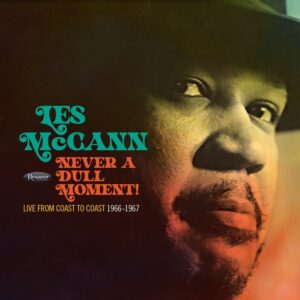 their departures. I am reviewing these albums in tandem as they share several qualities. Most of the music on these collections was recorded at Seattle’s Penthouse Jazz Club and broadcast in stereo by the local radio station KING-FM. Reissue producer Zev Feldman has retrieved several fine concerts capturing the artists in top form. However, it should be understood that both Jamal and McCann made significant changes to their respective styles in the periods following the years represented on the discs (1963-1968 for Jamal; 1966-1967 for McCann). As listeners progress through the Jamal albums, all titled “Emerald City Nights“, they will hear increasingly dense settings of standards—certainly a step beyond the spare arrangements of the Pershing Hotel recordings but far from the intensity of his Impulse albums. The McCann collection, “Never a Dull Moment“, is an accurate reflection of the pianist’s work before his appearance at the 1969 Vienna Jazz Festival. Up until then, McCann’s trio played a lot of “feel-good” tunes. Nothing wrong with that, of course, but it is a far cry from the explosive Vienna performance of “Compared to What”, which influenced McCann’s musical direction for the rest of his life. Listeners seeking that later-period McCann style will not find anything like it on the Resonance set. One last point: While the McCann set is spread out over 3 CDs, the music would have fit on 2 discs; the Jamal is even worse in this respect: it could have been issued as a handsome boxed set with 4 well-filled CDs. Instead, it is spread out over 6 discs in 3 double-disc packages with the same cover art, using color filters to differentiate between the 3 volumes (green is Volume 1, blue is Volume 2, and purple is Volume 3). There are no artistic reasons to use more discs than necessary to issue this music, and because of the extra discs, the prices of these sets have been needlessly inflated. This is a bad business practice which is unfair to the artists and their loyal audiences.
their departures. I am reviewing these albums in tandem as they share several qualities. Most of the music on these collections was recorded at Seattle’s Penthouse Jazz Club and broadcast in stereo by the local radio station KING-FM. Reissue producer Zev Feldman has retrieved several fine concerts capturing the artists in top form. However, it should be understood that both Jamal and McCann made significant changes to their respective styles in the periods following the years represented on the discs (1963-1968 for Jamal; 1966-1967 for McCann). As listeners progress through the Jamal albums, all titled “Emerald City Nights“, they will hear increasingly dense settings of standards—certainly a step beyond the spare arrangements of the Pershing Hotel recordings but far from the intensity of his Impulse albums. The McCann collection, “Never a Dull Moment“, is an accurate reflection of the pianist’s work before his appearance at the 1969 Vienna Jazz Festival. Up until then, McCann’s trio played a lot of “feel-good” tunes. Nothing wrong with that, of course, but it is a far cry from the explosive Vienna performance of “Compared to What”, which influenced McCann’s musical direction for the rest of his life. Listeners seeking that later-period McCann style will not find anything like it on the Resonance set. One last point: While the McCann set is spread out over 3 CDs, the music would have fit on 2 discs; the Jamal is even worse in this respect: it could have been issued as a handsome boxed set with 4 well-filled CDs. Instead, it is spread out over 6 discs in 3 double-disc packages with the same cover art, using color filters to differentiate between the 3 volumes (green is Volume 1, blue is Volume 2, and purple is Volume 3). There are no artistic reasons to use more discs than necessary to issue this music, and because of the extra discs, the prices of these sets have been needlessly inflated. This is a bad business practice which is unfair to the artists and their loyal audiences.
